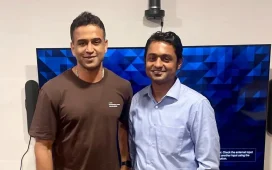Tech giant Google has heavily invested in the Indian tech startup ecosystem, supporting them through its Google for Startups Accelerator program.
In 2024, the company announced its plan to train 10,000 AI startups in India through a partnership with MeitY Startup Hub.
In an exclusive interaction with AIM as part of the Tech Talks series, Paul Ravindranath, program manager, developer relations, startup and expert programs at Google India, and Karthik Padmanabhan, developer ecosystem lead at Google India, offered insights on the company’s growing role in India’s startup ecosystem, what AI startups need to know, and the tech giant’s stance on the Indian AI landscape.
From Equity-Free Mentorship to AI at Scale
‘Google for Startups’ accelerator journey started modestly in 2015 with a one-week Launchpad. Today, it supports over 1,500 startups globally, including 250 from India.
The natural next question was, “How do you select a startup?” Ravindranath laid out a rigorous process. He explained that each cohort draws over a thousand applicants for just twenty slots. Shortlisting involves multiple rounds of evaluation, culminating in in-depth interviews focused on one question.
“We interact in person with the company to answer one fundamental question: can we add value to this company at this stage? And if the answer is yes, the likelihood of them making it is high,” He said.
He highlighted that the process starts with a comprehensive diagnostic to identify the startup’s objectives and areas they might overlook.
Meanwhile, Padmanabhan mentioned that they have a system called the objective key result area (OKR) driven model, which Google drives internally. “We apply the same model for startups, so they decide what their objectives are and what the key result areas are, and by what time frame they want to achieve that,” he said.
But what if the startup is building something that competes with Google?
Padmanabhan answered the question, saying they are focused on finding passionate teams irrespective of their offerings, eager to solve problems, and seeking guidance to utilise the accelerator program effectively. He believes this creates a mutually beneficial scenario where their success aligns with the program’s goals.
Trust also matters, especially when the program is equity-free. So, how does Google convince them there’s no catch?
Padmanabhan explained that startups have numerous avenues to raise equity. However, when they require technical and engineering assistance, venture capitalists (VCs) typically cannot provide direct support. Google is willing to bridge that gap.
While VCs can offer equity, their technical contribution is usually limited to making connections for advice. Our core strength lies in our experience with various challenges and our ability to provide solutions based on that familiarity, he added.
From Hiring to Hurdles: What It’s Like to Build with or around Google in India
The question of how someone can land a job at Google and what advice they would give to an aspirant brought candid responses.
Padmanabhan stressed that depth matters more than breadth. To outperform machines, one must specialise and develop deep expertise in one’s chosen field. Ravindranath added that while learning is easier now, the fundamentals—problem-solving, curiosity, and rigour—remain unchanged.
Earlier this year, Google opened its fourth campus in Bengaluru and named it Ananta. According to Ravindranath, the city’s choice stems from talent, infrastructure, and long-standing investment.
When asked if there is a problem in the Indian startup space building with AI, Ravindranath explained that starting a company is challenging and requires significant commitment. “Bangalore has many founders, but addressing big problems demands drive and passion,” he said, adding that he believes Indian founders are tackling diverse issues using AI and platforms like Android and are doing impressive work.
What’s Next in the AI Hype Cycle?
Ravindranath acknowledged the rapid advancements in AI and noted that in the fast-paced changing technology world, something relevant last week may no longer hold true the following week. Therefore, he suggested that embracing all possibilities would be wise, as the potential of this platform shift remains uncertain.
He recalled how a few years ago, SEO was all the rage—now it’s GEO, or Generative Engine Optimisation. Marketing, development, even prototyping—it’s all changing.
“There’s a lot of negativity around AI that is being overhyped, like people losing jobs, employment opportunities going away. This is all going to evolve. So it will evolve into something different, something new…But fundamentally, nothing is going to change,” Padmanabhan concluded.









